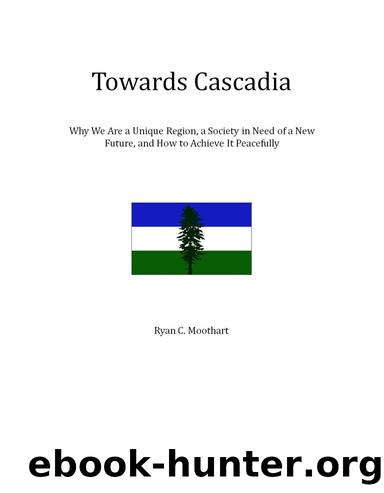Towards Cascadia by Moothart Ryan C.;

Author:Moothart, Ryan C.;
Language: eng
Format: epub
ISBN: 978-1-63413-798-0
Publisher: Publish Green
When society, on both micro and macro levels, is agreed by the greatest percentage its citizens possible to be most just and tranquil.
When the power to choose is maximized for both individuals and society at large simultaneously.
When society at large does not violate or does not allow its citizens to violate the inalienable liberties that should be afforded to all individuals.
This reality requires compromise between the essential notions of individualism and communalism. Rules and regulations set by a democratic society for the purpose of ensuring that opportunity exists for the masses may be perceived by an individual who is negatively affected by such rules as a violation of his or her individual liberty. The bigger pictureâthe balance of freedomâshould always be kept in mind. In this sense, the absolute notions of individual libertyâthat any and all actions made by individual should be unrestricted short of direct physical injury upon anotherâmust be violated to some extent in order for freedom to exist.11 Any one individual can find some fault with the laws established by a collective authority, but he or she can retain liberty, along with society at large, as long as the laws society puts in place do not prevent him or her from pursuing self-interest and do not constrain him or her from exercising expressions of individuality that do not directly harm another individual. Compromise requires the rejection of absolutist interpretations of what freedom means. Society must stand on principles that influence political decisions and reject a foundation based upon the desire to achieve an impossible reality. Within these principles is plenty of room for compromise, which is necessary for society to live peacefully and progress in its pursuit of true freedom and justice.
How does a nation achieve such a practical balance of liberties in the political sense and therefore secure freedom? How do we know what that balance looks like? I, or any other individual, cannot prescribe the exact sets of laws or statutes that will secure freedom for a given society. There are bound to be countless combinations of existing and new ideas that could work to achieve this balance. However, we can conclude, given what weâve explored in this book thus far, that this balance will be reached through a combination of rational expectations, social obligations, legal parameters, and the like. These tangible expressions of a societyâs social contract are based on and directly tied to a societyâs identity, history, and guiding principlesâsocietyâs ethos. And, as I proposed earlier in this book, a societyâs ethos is grounded in that societyâs environment.
This is where bioregionalism comes back into the discussion. If societal ethos is defined, at least in part, by a bioregionâs environmental distinctions, thereby fundamentally differentiating societal ethos from one another on the bioregional level of ecological distinction, then the proper balance of liberties in a society needed to achieve freedomâwhich will be attained through a combination of the elements of that societyâs social contract, which are, in turn, based
Download
This site does not store any files on its server. We only index and link to content provided by other sites. Please contact the content providers to delete copyright contents if any and email us, we'll remove relevant links or contents immediately.
| Anarchism | Communism & Socialism |
| Conservatism & Liberalism | Democracy |
| Fascism | Libertarianism |
| Nationalism | Radicalism |
| Utopian |
The Secret History by Donna Tartt(19088)
The Social Justice Warrior Handbook by Lisa De Pasquale(12190)
Thirteen Reasons Why by Jay Asher(8910)
This Is How You Lose Her by Junot Diaz(6887)
Weapons of Math Destruction by Cathy O'Neil(6280)
Zero to One by Peter Thiel(5802)
Beartown by Fredrik Backman(5754)
The Myth of the Strong Leader by Archie Brown(5507)
The Fire Next Time by James Baldwin(5446)
How Democracies Die by Steven Levitsky & Daniel Ziblatt(5219)
Promise Me, Dad by Joe Biden(5153)
Stone's Rules by Roger Stone(5088)
A Higher Loyalty: Truth, Lies, and Leadership by James Comey(4964)
100 Deadly Skills by Clint Emerson(4925)
Rise and Kill First by Ronen Bergman(4789)
Secrecy World by Jake Bernstein(4753)
The David Icke Guide to the Global Conspiracy (and how to end it) by David Icke(4720)
The Farm by Tom Rob Smith(4513)
The Doomsday Machine by Daniel Ellsberg(4490)
